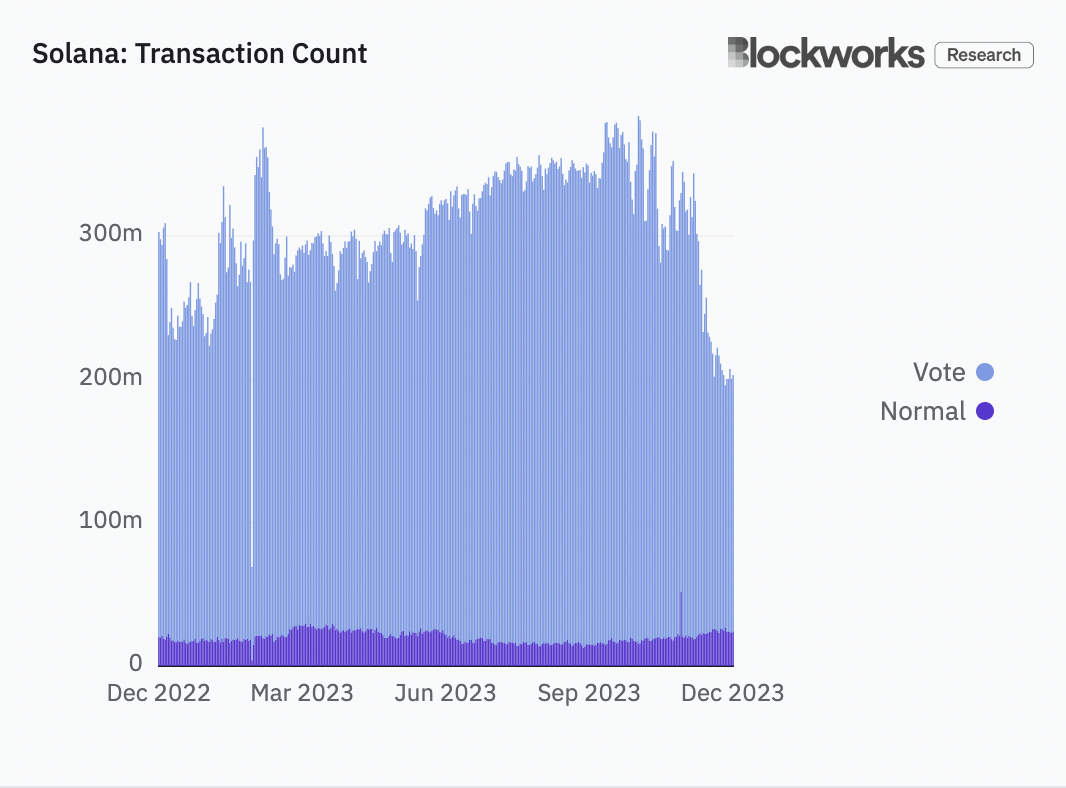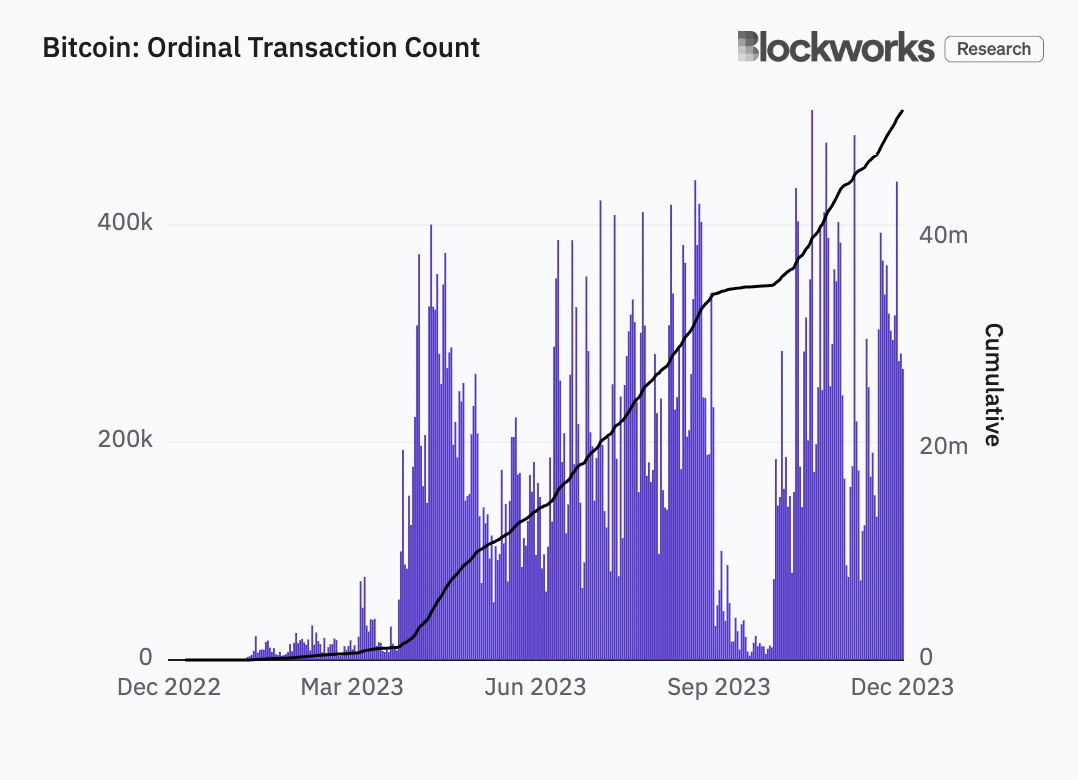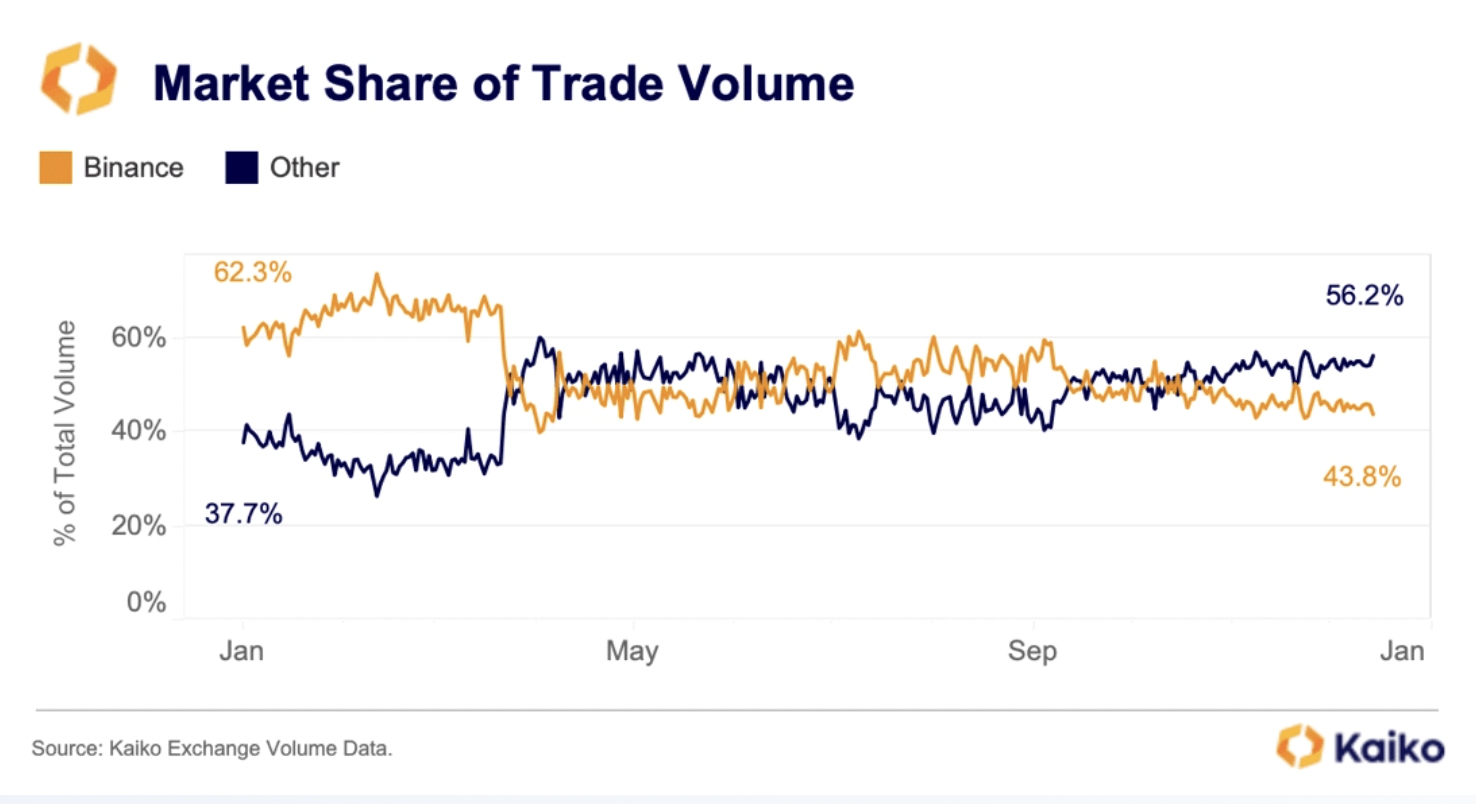The charts that defined crypto in 2023

During the final three months of 2023, there was a marked increase in the values of cryptocurrencies like bitcoin and ether, which rose by 51% and 36% respectively. This upward trend in the market has left many traders feeling optimistic about what’s to come in 2024.
As investors get their 2024 strategies in order, here is a review of some of the charts and data points that defined the crypto market in 2023.
Bitcoin’s correlation with stocks
Bitcoin’s correlation with the S&P 500 and Nasdaq Composite indexes whipsawed this year.
The asset was most closely correlated with the S&P 500 in February 2023, when its 30-day rolling average coefficient hit 0.9. The max is 1, meaning they are each trading perfectly in tandem. Bitcoin’s S&P 500 correlation dipped to a low of -0.77 at the end of October 2023, before bouncing back to around 0.75 to end the year.
Read more: With days left, analysts hold out hope for new crypto highs in 2023
The tech-heavy Nasdaq Composite followed a similar trend with bitcoin this year, hitting peak correlation of 0.93 in February. Bitcoin’s Nasdaq correlation also dipped at the end of October, hitting a low of -0.71. As of Dec. 27, 2023, bitcoin’s 30-day rolling Nasdaq Composite correlation was back to 0.67.
Periods of tight correlation often coincided with broader macroeconomic trends and events, such as Federal Reserve meetings and inflation reading releases. Bitcoin and the S&P 500 hit a correlation of 0.72 on Dec. 13, 2023, the day the Fed announced it would be cutting rates in 2024.
Solana non-vote transactions moving up

Solana is up nearly 900% in 2023, thanks primarily to a rally that kicked off in October. The blockchain’s native token gained more than 300% during the fourth quarter of the year. Solana (SOL) was headed for a last minute correction Thursday though, losing around 9%.
Read more: Meme coins unwind, SOL loses 9% in 24 hours
The seven-day moving average of non-vote transactions on Solana hit a high of 34 million this week.
Despite Thursday’s decline, the year on the whole has been eventful for the Solana blockchain. 85% of protocols on the chain are now open source, as opposed to 30% in 2021. Circle also debuted its Euro stablecoin (EURC) on Solana in December. The stablecoin issuer selected Solana for its “ulta-fast, near zero cost network,” Circle said on X at time of launch.
Ordinals are back on the rise

Ordinals debuted in January 2023, introducing a new method for embedding unique digital assets onto individual satoshis in the Bitcoin blockchain.
Ordinal sales peaked in May 2023 with $452 million in transactions before dipping to around $3 million by August, but transactions are back on the rise. There were more than 267,000 transactions on Dec. 27 alone.
While demand has ebbed and flowed, Ordinals have also made transactions on the network more expensive and slower to settle. Over the past year, the average transaction fee has soared upwards of 25x, according to Blockworks research.
Though Ordinals have spurred interest by introducing new use cases for the Bitcoin blockchain, they have also led to significant congestion in the network’s mempool.
Read more: Ethereum won’t flip Bitcoin anytime soon, but Ordinals could change that
This is evidenced by increased transaction times and fees, caused by the larger data size of Ordinals inscriptions, which take up more space in blocks and therefore reduces the network’s transaction processing capacity.
Binance remains dominate exchange by volume

Binance, which made headlines in November when the exchange entered into a historic settlement of $4.3 billion with the US Department of Justice and the Commodity Futures Trading Commission, is still the top exchange by trading volume, but its market share did take a dip this year.
The CFTC announced it had charged Binance in March for allegedly moving high-volume US-based traders from Binance.US to Binance. The news gave a significant blow to Binance’s total market share, losing around 20%.
The SEC also charged Binance in June for, among other things, allegedly commingling assets. This resulting legal battle remains ongoing.





 Bitcoin
Bitcoin  Ethereum
Ethereum  Tether
Tether  USDC
USDC  Dogecoin
Dogecoin  Cardano
Cardano  TRON
TRON  Chainlink
Chainlink  LEO Token
LEO Token  Stellar
Stellar  Hedera
Hedera  Litecoin
Litecoin  Bitcoin Cash
Bitcoin Cash  Monero
Monero  Dai
Dai  OKB
OKB  Gate
Gate  Ethereum Classic
Ethereum Classic  VeChain
VeChain  Cronos
Cronos  Cosmos Hub
Cosmos Hub  Algorand
Algorand  KuCoin
KuCoin  Maker
Maker  Stacks
Stacks  Theta Network
Theta Network  Tether Gold
Tether Gold  Tezos
Tezos  IOTA
IOTA  NEO
NEO  Zcash
Zcash  TrueUSD
TrueUSD  Polygon
Polygon  Synthetix Network
Synthetix Network  Dash
Dash  Zilliqa
Zilliqa  0x Protocol
0x Protocol  Qtum
Qtum  Basic Attention
Basic Attention  Decred
Decred  Holo
Holo  Siacoin
Siacoin  Ravencoin
Ravencoin  NEM
NEM  Enjin Coin
Enjin Coin  DigiByte
DigiByte  Nano
Nano  Ontology
Ontology  Waves
Waves  Hive
Hive  Lisk
Lisk  Status
Status  Pax Dollar
Pax Dollar  Huobi
Huobi  Numeraire
Numeraire  Steem
Steem  BUSD
BUSD  OMG Network
OMG Network  Ren
Ren  Bitcoin Diamond
Bitcoin Diamond  Augur
Augur  Bitcoin Gold
Bitcoin Gold  HUSD
HUSD  Kyber Network Crystal Legacy
Kyber Network Crystal Legacy